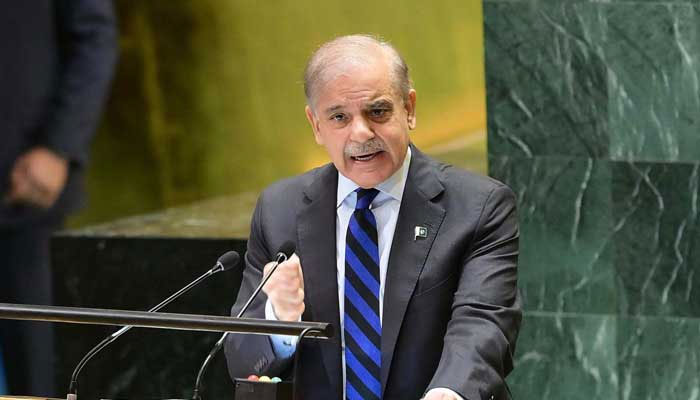PM at the UN
PM focused on other problems that disproportionately affect vulnerable nations like Pakistan
In a forceful and impassioned please for justice and peace, Prime Minister Shehbaz Sharif’s address to the 79th session of the United Nations General Assembly shone a spotlight on the occupied territories of Palestine and Kashmir, making a case for the global community’s moral obligation to end the injustices in these regions. Whether mothers in Gaza holding the lifeless bodies of their children or Kashmiris living under the yoke of brutal occupation, the prime minister demanded that the world pay attention. And the Pakistani delegation walked its talk as well – through its symbolic walkout during Israeli Prime Minister Benjamin Netanyahu’s speech. PM Shehbaz did not mince any words when addressing India’s brutal occupation of Kashmir. Referring to New Delhi’s August 2019 unilateral revocation of Jammu and Kashmir’s special status, the prime minister warned that this measure would fail, while also reminding India that Pakistan would respond “to any Indian aggression”.
From the Ukraine war to climate change, poverty, and rising debt burdens, the prime minister focused also on these other problems that disproportionately affect vulnerable nations like Pakistan. In his remarks on the climate crisis, he highlighted the injustice of Pakistan’s plight: despite contributing less than one percent to global emissions, the country suffered $30 billion in damages from catastrophic floods in 2022. It is in this context that his call for the principle of ‘the polluter must pay’ to be upheld has to be seen – an indictment indeed of the Global North’s environmental responsibility. The prime minister also spoke on issues affecting Pakistan domestically, in particular terorism. Reiterating Pakistan’s commitment to combating the terror that has cost the nation 80,000 lives and $150 billion in economic losses was important – despite observeers questioning why he brought up domestic issues. However, it is important for Pakistan to point out just how much of the country stands exposed to terror due to policies propped up by Western nations.
While calling for collective global action on issues like climate change, poverty, and terrorism, Prime Minister Shehbaz Sharif made the very important point that the Global South countries (like Pakistan) need help and support to achieve SDGs and climate goals; this would include climate finance as promised by developed countries. The UN Summit of the Future has just adopted the Pact for the Future. As a signatory, Pakistan must push all it can for a more equitable climate justice model – one in which, as PM Shehbaz put it, the polluter pays. And pays well and on time. Eventually, the question we ask after every such international gathering is: will the global community finally rise to the challenge, or will it once again turn a blind eye to the systematic subjugation of the oppressed, the sheer injustice against the poor and under-developed, and the impunity of those that collude with the West in its power games? The prime minister’s final words – “The weak are not voiceless, the oppressed should not lose hope " – make one wonder whether the world will ever be willing to take action.
-
 World Economic Forum CEO Borge Brende Steps Down Following Jeffrey Epstein Ties Controversy
World Economic Forum CEO Borge Brende Steps Down Following Jeffrey Epstein Ties Controversy -
 Prince Harry's Ex Chelsy Davy Makes Special Announcement
Prince Harry's Ex Chelsy Davy Makes Special Announcement -
 Dominic Evans Speaks Out After Being Accused Of Being Involved In Nancy Guthrie Kidnapping
Dominic Evans Speaks Out After Being Accused Of Being Involved In Nancy Guthrie Kidnapping -
 AI Doomsday By 2028? New Study Warns Of Global Social, Economic Disruption & ‘ Intelligence Crisis’
AI Doomsday By 2028? New Study Warns Of Global Social, Economic Disruption & ‘ Intelligence Crisis’ -
 Do Sophie And Benedict Bridgerton Get Married As Netflix Show Returns For Season 4 Part 2?
Do Sophie And Benedict Bridgerton Get Married As Netflix Show Returns For Season 4 Part 2? -
 Prince William Reveals He's 'a Little Biased' Toward One Hollywood Star
Prince William Reveals He's 'a Little Biased' Toward One Hollywood Star -
 Meghan Markle, Prince Harry Visit Special Charity On Final Day Of Jordan Trip
Meghan Markle, Prince Harry Visit Special Charity On Final Day Of Jordan Trip -
 Natalie Dormer's Reaction To Sarah Ferguson's Epstein Links Resurfaces After 'The Lady' Release
Natalie Dormer's Reaction To Sarah Ferguson's Epstein Links Resurfaces After 'The Lady' Release -
 Did You Know Famous Windows 10 Background Was Shot In Real Life? Here's Story
Did You Know Famous Windows 10 Background Was Shot In Real Life? Here's Story -
 Pete Davidson's Baby Mommy Elsie Hewitt Reveals Why She 'hated' Being Pregnant
Pete Davidson's Baby Mommy Elsie Hewitt Reveals Why She 'hated' Being Pregnant -
 Harry, Meghan Show Royal Family How To Make Impact Without Public Money
Harry, Meghan Show Royal Family How To Make Impact Without Public Money -
 Hillary Clinton Set For Deposition Before House Committee Today In Jeffrey Epstein Investigation Case
Hillary Clinton Set For Deposition Before House Committee Today In Jeffrey Epstein Investigation Case -
 Samsung Galaxy S26 Ultra Debutes With Display That Blocks Side Viewers
Samsung Galaxy S26 Ultra Debutes With Display That Blocks Side Viewers -
 Fans In Shock As 'Smiling Friends' Creators End Cult-favourite Sitcom On Adult Swim: 'They Did It On Purpose'
Fans In Shock As 'Smiling Friends' Creators End Cult-favourite Sitcom On Adult Swim: 'They Did It On Purpose' -
 Meghan Markle Accused Of Mimicking Kate’s Iconic Style On 'pseudo Royal Tour'
Meghan Markle Accused Of Mimicking Kate’s Iconic Style On 'pseudo Royal Tour' -
 Social Media Addiction ‘like Smoking’: Mumsnet Calls For Under-16s Ban With Cigarette-style Warnings
Social Media Addiction ‘like Smoking’: Mumsnet Calls For Under-16s Ban With Cigarette-style Warnings




